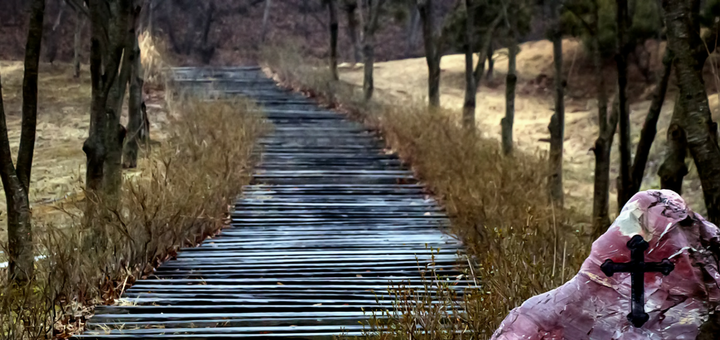
 Image created by the author in Canva.[/caption]
It seems in life we are always craving that which is the opposite of our present circumstance. When we experience pain, we wish for relief; when we experience loneliness, we wish for company; when it’s too hot, we wish for cooler air. Our bodies seem to be continuously in opposition to what we have. We are endlessly holding on to hope that life will turn around and ease the burdens of our physical life.
Ironically and at times, emotionally painfully -- if not understood -- this pull of opposition is meant to perfect our souls, in carrying the desire to betters ourselves admits the worldly wantings. Consequently, our bodies are compelled to seek the desire for it to be made happy again -- not in the physicalitiess of life -- but in the divine. We will then be led to an interior happiness, something in which we could have never know, if we had not accepted this pull away from physical pleasures.
Suffering, then, is a wonderful gift and should be readily accepted and endured.
It is hard to take ourselves out of the scenario of multiple-children commotion to find the time for contemplation -- while still holding on to the essence of our being -- in which we were created. It is a delicate balance.
Image created by the author in Canva.[/caption]
It seems in life we are always craving that which is the opposite of our present circumstance. When we experience pain, we wish for relief; when we experience loneliness, we wish for company; when it’s too hot, we wish for cooler air. Our bodies seem to be continuously in opposition to what we have. We are endlessly holding on to hope that life will turn around and ease the burdens of our physical life.
Ironically and at times, emotionally painfully -- if not understood -- this pull of opposition is meant to perfect our souls, in carrying the desire to betters ourselves admits the worldly wantings. Consequently, our bodies are compelled to seek the desire for it to be made happy again -- not in the physicalitiess of life -- but in the divine. We will then be led to an interior happiness, something in which we could have never know, if we had not accepted this pull away from physical pleasures.
Suffering, then, is a wonderful gift and should be readily accepted and endured.
It is hard to take ourselves out of the scenario of multiple-children commotion to find the time for contemplation -- while still holding on to the essence of our being -- in which we were created. It is a delicate balance.
It is interesting how anxiety manifest itself on the natural level. In the mass population as a whole it would seem that “oral” insatiability were steadily on the increase. From the increase of alcoholism down to the harmless levels of oral pleasures (which have created entire industries), anxiety appears to assume a uniform epidemic pattern. Psychoanalytically there exists a close relationship between oral and visual primitive libidinal patterns, which means that the tremendous modern appeal of moving pictures, television, and illustrated magazines must be included in the pattern. This is almost like an inversion of the Christian ideal of contemplation in which the primitive instinctual forces are harnessed and the person keeps himself “open” for the word of God. Thus many of us, the restless, searching, analytical power of the intellect which pries open the secrets of Matter has become the only aspect of Truth. We are no longer able to sit still, to wait, to listen. We refuse to be receptive. We have to create a continuous noise to drown out the stillness of the world. -Karl Stern, The Third Revolution: A Study of Psychiatry and ReligionAs the world craves that which is immediately gratifying, we must stand strong in resisting. Without seeking the stillness, the silence, and the quiet, we can easily become stuck in an endless cycle of fulfilling our bodies, not our souls. We can eat and eat and eat; we can binge-watch every show on demand to make us forget about the demands of life; we can live childless – by choice – and only fulfill the desire of making ourselves happy – though still we will untimely feel anxious and unfulfilled, but, why? Why do we not feel fulfilled at the end of our lives when we choose to leave the serving and sacrificing for the immediately satisfying? What are we resisting, what are we avoiding, why do we wish to escape from the realities of our daily lives? Do we do this to feel whole? To feel as if we are not alone? To feel as if we are not in opposition of our bodies all of the time? As the anxieties creep in our physiological minds I urge you to turn inward, find that time for contemplation and discover the freeing of our anxieties – the denial of worldly pleasures. If you wish to understand the psychological reasons why we are feeling the way we do in this generation, please take the time to read The Third Revolution by Catholic psychologist Karl Stern – paying close attention to the last few chapters which are a treasure for the Church on the topic of Catholic psychology.
Copyright 2018 Janele Hoerner
About the Author

Janele Hoerner
Janele Hoerner is a happily married homeschooling mother of 8 living children and 4 more souls that have gone on to meet Christ. She scribbles her thoughts on sticky notes throughout the day in the middle of countless pushes on the swing, endless calls for Mommy, and never-ending tasks that aim at perfecting the soul.


.png?width=1806&height=731&name=CatholicMom_hcfm_logo1_pos_871c_2728c%20(002).png)
Comments